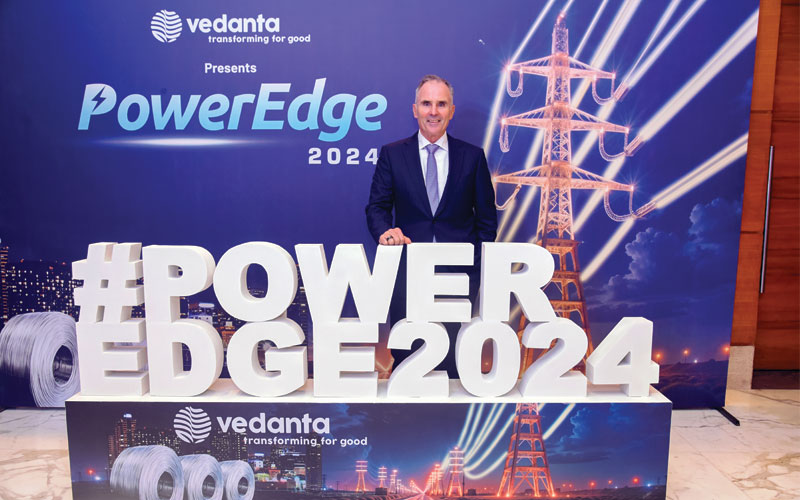In the fiscal year 2024, Vedanta Aluminium contributed over half of India’s aluminium output, reaching a staggering 2.37 million tonnes. Its mega aluminium smelter in Jharsuguda, Odisha, the largest in the world, is also the sole Indian smelter among the global ‘1 Million Tonne’ production and export members. Along with BALCO, India’s iconic aluminium smelter based in Chhattisgarh, they have helped Vedanta Aluminium emerge as a frontrunner in the production of value-added aluminum products essential in a wide range of industries.

Known as the ‘Metal of the Future’, aluminium is set to take the lead as the most significant business metal in the coming years, as it offers exceptional design flexibility as well as superb conductivity. Moreover, its distinct characteristics, including a high strength to weight ratio, resistance to corrosion, lightness, exceptional malleability, and endless recyclability, make it a popular choice in sectors such as aerospace, aviation, electrical, transportation, infrastructure, electric vehicles, and renewable energy, among others. Vedanta Aluminium, the biggest producer of aluminium in India and a top international producer, operates in Odisha and Chhattisgarh, serving clients in nearly 60 countries.
In the fiscal year 2024, the company contributed over half of India’s aluminum output, reaching a staggering 2.37 million tonnes. It manages a 3.5 million tonnes per annum alumina refinery located in Odisha’s Lanjigarh. This refinery supplies its extensive aluminum smelting operations at Jharsuguda, Odisha, and Bharat Aluminium Company Limited (BALCO), situated in Korba, Chhattisgarh. BALCO was established in 1965, marking the inception of a Public Sector Unit (PSU). However, in 2001, the Government of India sold 51% of BALCO’s shares to Sterlite Industries, which is now operating under the name Vedanta Limited. The Jharsuguda facility stands as the globe’s largest aluminum plant, boasting a smelting capacity of 1.8 million tonnes and a complementary 3615 MW thermal power plant. It is the sole Indian smelter among the global ‘1 Million Tonne’ production and export members and contributes to making Vedanta Aluminium a frontrunner in the production of value-added aluminum products, which are essential in a wide range of industries.
John Slaven, the CEO of the company, mentioned, “We currently hold approximately 50% of the market share within the core segment in India. The country is experiencing a growth rate of about 15% annually, which means it doubles every five years.” He emphasized the company aims to maintain its market position and shared the belief that there’s a significant opportunity for further expansion. “This is a major motivation for us. Additionally, we are highly profitable. We are in the process of achieving full vertical integration. This involves us mining our own bauxite, refining it into alumina, which is then used in metal production, and having our own coal in thermal power plants for electricity generation.” He also highlighted the company’s capital efficiency, noting that the cost of developing new capacity in India is relatively low. “This makes the return on investment very appealing, and the market is showing strong demand for it, making it economically sensible for us to invest,” he stressed.
Watch: RR Kabel | Solar Cables | Solar Plant | Renewable Energy
Products
The company’s diverse product portfolio includes Restora low carbon aluminium, billets, wire rods, P1O2O ingots, and rolled products, catering to the energy and electrical sectors. At the recent industry event PowerEdge 2024, the company showcased two new offerings: the AL59 Ingot and the Electrical Conductor (EC) Grade Wire Rod for fine drawing applications. The AL59 Ingot boasts superior electrical conductivity, making it ideal for remelting applications. The EC grade wire rod, designed for winding strip uses, delivers a balance of strength, conductivity, workability, and formability – features that make it well-suited for fine drawing, conforming, and enamelling in transformer and motor winding applications.
In a country where electricity demand grew by 7% in 2023 and is expected to rise 6% annually through 2026, these new products are poised to play a crucial role. They will help ensure a reliable, affordable, and uninterrupted power supply, which is essential for developing an efficient and robust infrastructure that optimally utilizes electricity from generation to load centers. The company claims its wire rods, with their superior conductivity and design flexibility, have become crucial in driving efficiency and sustainability in the energy sector. “By leveraging our expertise, cutting-edge technology, and in-depth understanding of our customers’ unique requirements, we aim to help them achieve greater efficiency, develop innovative product applications, and meet their sustainability goals in a highly competitive global landscape,” said Mr. Slaven.
The company boasts a production capacity of 650 kilotonnes (KT) for wire rods, enabling them to offer a wide range of top-quality products for the electrical industry. These include EC-grade wire rods, alloy wire rods, and flip coils, all manufactured using cutting-edge technologies from Southwire (USA) and Continuus-Properzi (Italy) to ensure exceptional precision and quality. With this impressive scale and breadth of production, the company stands as the world’s largest producer of wire rods.
Market
Beyond its offerings that meet the needs of the wire and cable industry, Vedanta Aluminium also caters to sectors such as automotive, building and construction, infrastructure, aerospace, aviation, consumer goods, packaging, and many others. In addition to wire rods, the company also produces one of the largest ranges of high-quality aluminium products in the global industry. Mr. Slaven explained that the company operates two smelter sites with a total of three smelting units. The Jharsuguda location has two units – the original smelter focuses on the domestic market, and a newer smelter has been built in a special economic zone to serve the export market. Additionally, they have the BALCO smelter. In the last fiscal year, the company’s sales mix was approximately 60% export and 40% domestic, with their largest export market being Asia, excluding China. They also sell around 8% to Europe, to North America, but more to Mexico, and South America. The domestic demand is primarily concentrated in the northern regions.
Despite copper’s higher conductivity, aluminium is preferred as it is twice as light and durable in the face of weather elements, and much more cost-effective, making aluminium wire rods the preferred choice for deploying extensive networks of power transmission lines. Besides, its light weight is a crucial parameter for high-voltage power lines that transmit electricity over long distances: aluminium wires reduce the load on grid pylons and increase the distance between them, reducing expenses and construction time. Another special property of aluminium is that it is non-corrosive, ensuring a significantly longer service life (almost 40 years) with minimal maintenance. Additionally, it can be 100 percent recycled without losing its properties.
The CEO highlighted increased demand in transmission and distribution infrastructure, as distributed renewable power requires more connectivity. Electric vehicles also consume significantly more aluminium than internal combustion engine cars. Sustainable packaging, such as aluminium cans over plastic bottles, and energy-efficient building systems using aluminium extrusions, further contribute to the growing demand the company is experiencing.
Also Read: Sterlite Power Transmission: Driving Growth with Humanity
Sustainability
Sustainability is a core part of Vedanta’s DNA, according to Mr. Slaven. “We’ve been on a long journey to become the most sustainable company. It’s taken a lot of hard work, including our commitment to reach net zero emissions by 2050 or sooner.” This will be achieved through a combination of solar and wind power, as the company aims to phase out coal-fired capacity and increase its use of renewable energy to 30% by 2030. Vedanta is securing 1.3 GW of renewable energy from India’s Serentica Renewables, a mix of solar and wind power. “Over time, we want to wean ourselves off fossil fuels by securing renewable power so that we can produce green aluminum,” Mr. Slaven stressed.
Its low-carbon aluminium brand, Restora, is the result of its manufacturing expertise, innovative technologies, and commitment to net zero by 2050. Restora offers two product lines – standard low-carbon aluminium made with renewable energy, and Restora Ultra, an ultra-low carbon aluminum made from recovered aluminium through Vedanta’s partnership with Runaya Refining. Restora has a greenhouse gas emissions intensity well below the global threshold of 4 tonnes of CO2 per tonne of aluminum. When Mr. Slaven was asked about the bearings Carbon Border Adjustment Mechanism (CBAM) his company could face, he noted that CBAM would not disadvantage Vedanta, as the company has already addressed its Scope 1 and 2 emissions.
Outlook
The global aluminum market size, according to Straits Research, was valued at USD 150 billion in 2021, and is projected to reach USD 255 billion by 2030, growing at a CAGR of 6.1% during the forecast period (2022–2030). In India, the sector is a bright spot as the government rolls out infrastructure and industry seek to satisfy growing demand. Next Move Strategy Consulting put the size of the Indian aluminium market at $11.28 billion in 2023, and it is expected to reach $19.76 billion by 2030. In this landscape, the company is positioned as one of the world’s largest aluminium producers, and it takes pride in creating ‘market-responsive products and services that provide our customers an unmatched competitive advantage in their evolving business journey’.
Vedanta Aluminium is fulfilling its mission of spurring emerging applications of aluminium as the ‘Metal of the Future’ by marrying sustainable and efficient manufacturing practices with best-of-breed technology, the CEO shared. “As countries and companies make pace on their Net Zero commitments, the foreseeable future will be metals and minerals intensive. Being the largest aluminium producer from India, we are at the forefront of developing special alloys to cater to the rapidly evolving demands of a low carbon economy.”




